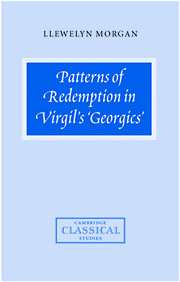2 - Aristeia
from PART I - Prima ab origine
Published online by Cambridge University Press: 05 July 2015
Summary
I
At the beginning of the Third Georgie the poet pictures himself flushed with success. Dismissing as hackneyed a representative selection of Callimachean and Neoteric themes, he expresses the wish to attempt a new direction in poetry, one that will allow him, it is implied, to match the achievements of Ennius, Lucretius – and even Octavian himself: at 10 the imagery depicting Virgil's future accomplishment becomes dominantly that of a military triumph – the procession of captives, the victor's palms, the votive temple, the celebratory ludi and dramatic performances.
This prologue has been a source of particular controversy even in a poem as fiercely contested as the Georgies. In one respect, however, it is not nearly as controversial as it used to be: these days, at any rate, by far the prevailing opinion has it that Virgil's prediction refers not to his current poem, the Georgics, but to the great epic to come, the Aeneid. If the anticipated poem seems so very unlike what the Aeneid was to become, the argument goes, this is only because its details were still vague in Virgil's mind.
The main piece of evidence habitually cited in favour of the view that it is the Aeneid which is the subject of the proem is the content of the poetry envisaged, which though hardly (in details) a very faithful representation of the Aeneid is considered to bear absolutely no relation to the content of the Georgics. The work prefigured is an epic, with everything – martial and panegyrical content – that categorization at this juncture entails. As such it is akin in aspiration to the compositions of Ennius, as line 9 implies, and Lucretius (who assimilates his own project to Homeric and Ennian epic at DRN I. 117–26). The work, furthermore, is contrasted with examples of subject-matter typical of Callimachean and neoteric production (4–8). The Georgics, on the other hand, cannot be described as an epic, therefore is not the object of the prediction.
- Type
- Chapter
- Information
- Patterns of Redemption in Virgil's Georgics , pp. 50 - 102Publisher: Cambridge University PressPrint publication year: 1999

